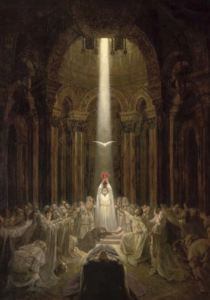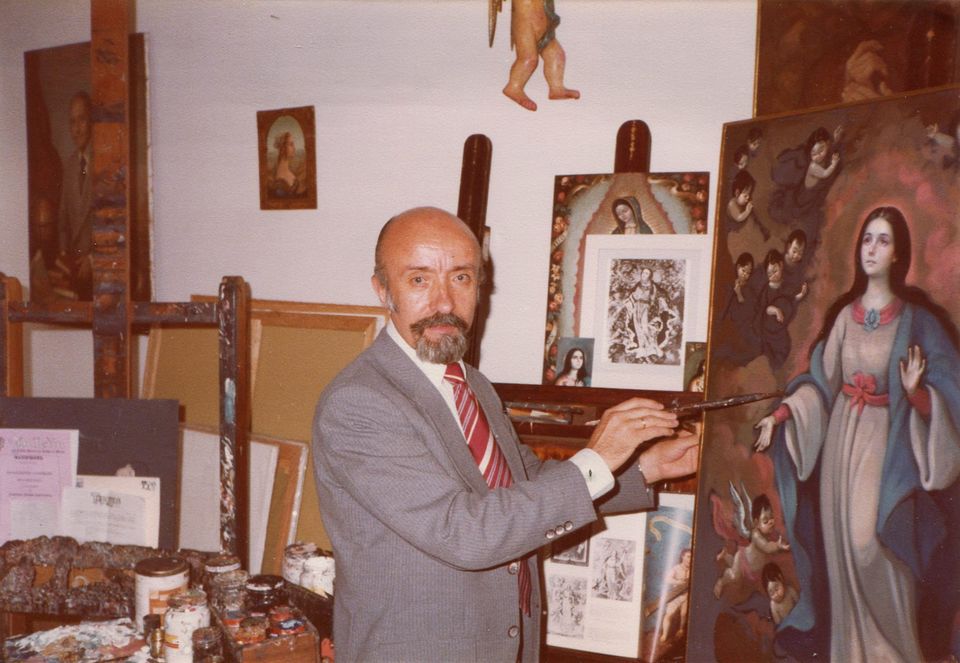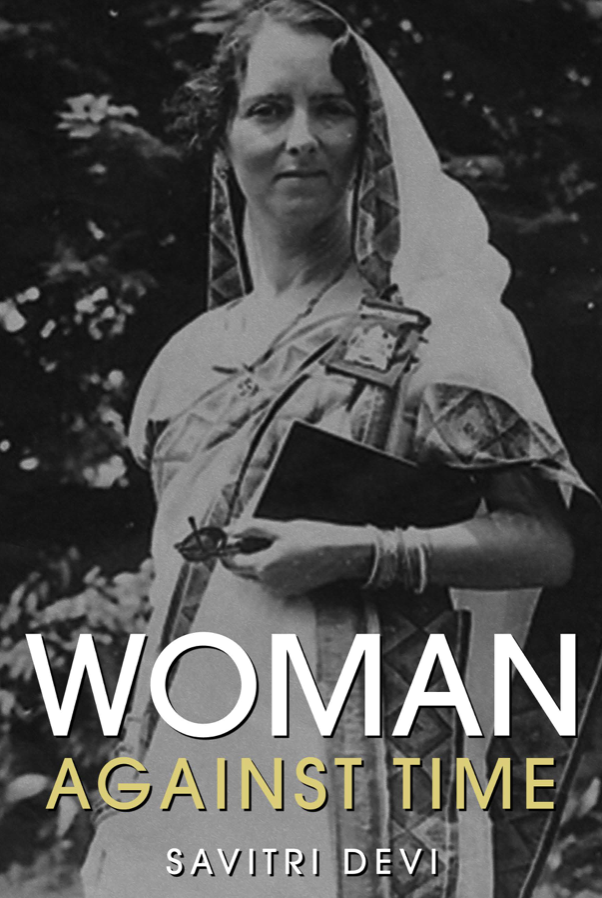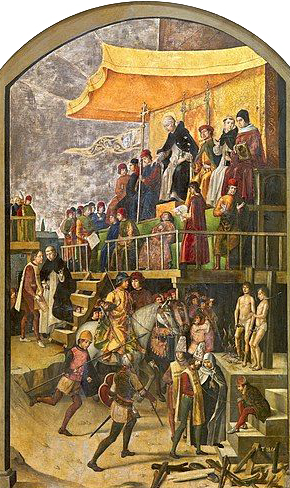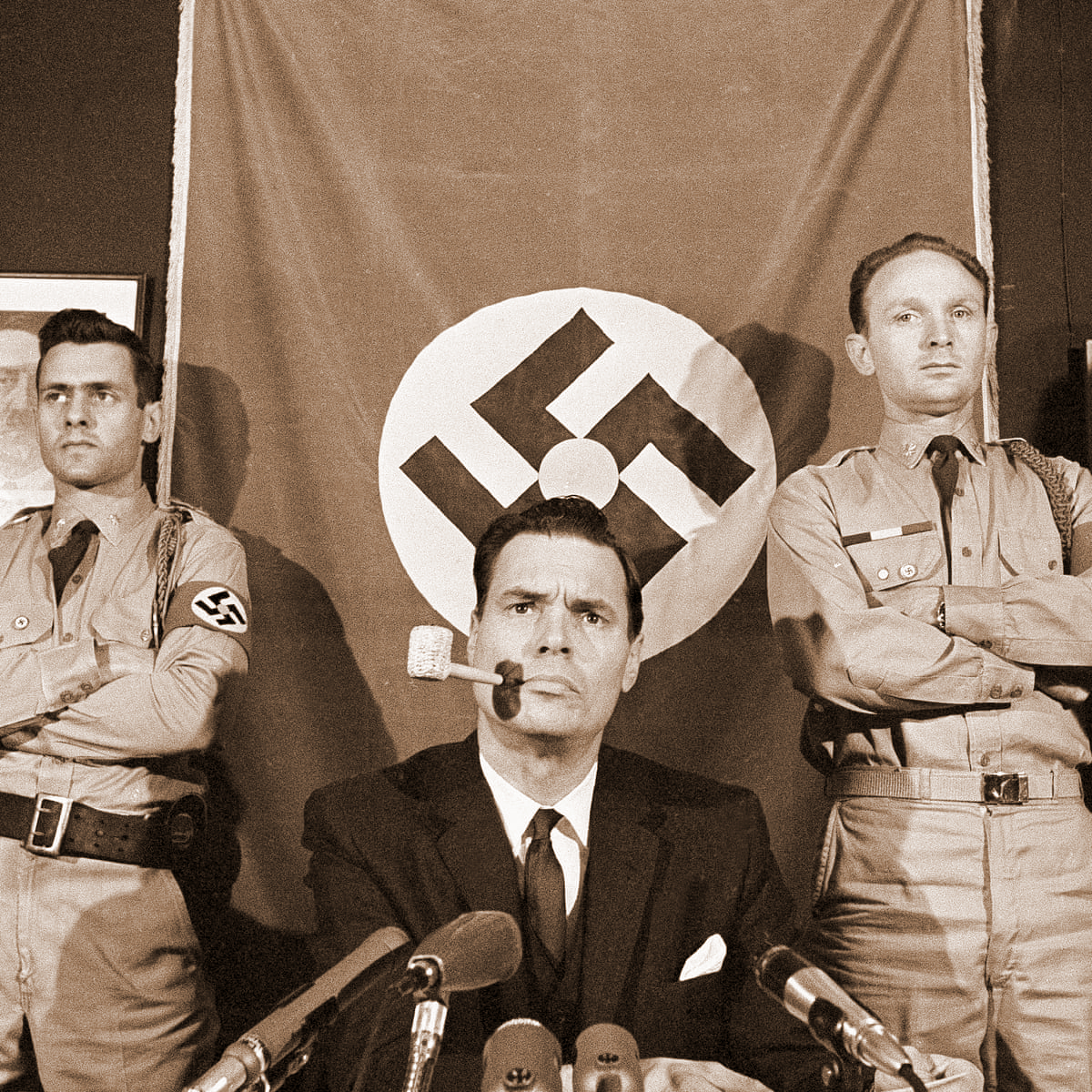Editor’s Note: Memories and Reflections of an Aryan Woman by Savitri Devi was written in 1968, 1971 and published in 1976. While the book edition I plan to publish on Daybreak Press contains the entire text of Memories, the following is only the first abbreviated chapter.
It wouldn’t make much sense to publish a new edition but the edition of the image below is out of print (in case it isn’t please let me know).
Yesterday, when I saw a few seconds of the last video of Richard Spencer chatting with his English colleague, I could no longer bear the lack of gravitas of these two pundits of the alt-right. Lack of gravitas is poison for priests or priestesses of the sacred words. In Savitri’s prose, ‘pale imitations [of NS] without heart’.
Since it is a long text, if you do not have time to read it pay attention to the words I highlighted in bold-type:
Chapter I—The Religion of the Strong
‘Enochia, monstrous City of the Manly, Den of the Violent, Citadel of the Strong, Which has never known fear or remorse’. —Leconte de Lisle (‘Cain’, Barbaric Poems)
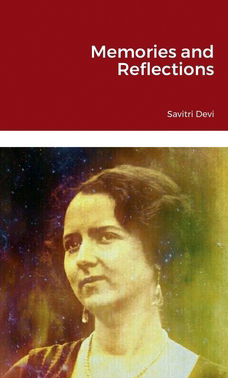 If I had to choose a motto for myself, I would take this one—pure, dure, sure (pure, hard, certain)—in other words: unalterable. I would express by this the ideal of the Strong, that which nothing brings down, nothing corrupts, nothing changes; those on whom one can count, because their life is order and fidelity, in accord with the eternal…
If I had to choose a motto for myself, I would take this one—pure, dure, sure (pure, hard, certain)—in other words: unalterable. I would express by this the ideal of the Strong, that which nothing brings down, nothing corrupts, nothing changes; those on whom one can count, because their life is order and fidelity, in accord with the eternal…
Free yourself from two deadly superstitions: the search for ‘happiness’ and concern for ‘humanity’… Help the animal and the tree—and defend them against the selfish and mean-spirited man…
But those who have the Word, father of thought, and among them the Strong especially, have something better to do than pursue ‘happiness’… The pleasure or the displeasure, the happiness or the discontent of the individual does not count. Well-being—beyond the minimum that is necessary for each to fulfil his task—does not count. Only the task counts: the quest for the essential, the eternal, through life and through thought…
He who has the Word, father of thought, and who, far from putting it in service of the essential, wastes it in the search for personal satisfactions; he who has technology, fruit of thought, and who makes use of it especially to increase his well-being and that of other men, taking that for the main task, is unworthy of his privileges. He is not worthy of the beings of beauty and silence, the animal, the tree—he who himself follows their path. He who uses the powers that the Word and thought give him to inflict death and especially suffering on the beautiful beings that do not speak, in view of his own well-being or that of other men, he who uses the privileges of man against living nature sins against the universal Mother—against Life—and the Order that desires noblesse oblige. He is not Strong; he is not an aristocrat in the deep sense of the word, but petty, an egoist and a coward, an object of disgust in the eyes of the natural élite.
All society, all ‘civilisation’ that proceeds from the same aspiration to human well-being above all, to well-being or human ‘happiness’ at any price, is marked by the seal of the Powers of Decadence, enemies of the cosmic order of the play of forces without end. It is a civilisation of the Dark Age. If you are obliged to suffer it, suffer it by unceasingly opposing it, denouncing it, combating it every minute of your life. Make it your glory to hasten its end—at least to cooperate with all your might with the natural action of the forces leading to its end. For it is accursed. It is organised ugliness and meanness.
Rid yourself not only of the superstition of ‘happiness’, if it ever allured you, but also that of man. Protect yourself from the attitude, as vain as it is stupid, that consists in trying ‘to love all men’ simply because they are men. And if this attitude was never yours, if, from childhood, you were impermeable to the propaganda of the devotees of ‘humanity’, give thanks to the immortal Gods to whom you owe this innate wisdom…
For ‘man’, who is esteemed so highly, is not a reality but a construction of the mind…
The most perfect Nordic specimen, whose heart is noble and whose judgment is firm and just, and whose features and carriage are those of the Greek statues of the finest age, is ‘a man’. A Hottentot, a Pygmy, a Papuan, a Jew, a Levantine mixed with Jews, are ‘men’. ‘Man’ does not exist. There exist only quite diverse varieties of primates that by convention are called ‘human’…
The ethnic chaos of the masses of a metropolis at the forefront of technological progress tends to acquire a uniformity of grayness, a kind of manufactured homogeneity—desired by those who control the masses—a sinister caricature of the relative unity natural to people of the same blood that binds a scale of values and common practices; a uniformity which, far from revealing a ‘collective mind’, at whatever level of awareness, reveals only the deterioration of a society that has definitively turned its back on the eternal—in other words: a damned society.
But one can still sometimes discover an exceptional individual within such a society, an individual who disdains the ethnic chaos that he sees around him and of which he is perhaps himself a product, and who, in order to escape, adheres to some doctrine of the extinction of the species, or even puts himself completely at the service of a true race, with all the renunciation that entails for him. The mechanism of heredity is so complex and the play of external influences so random that it is not possible to envisage who among the children of a declining society will become such individuals—no more than it is possible to envisage which new-born member of a tribe will aspire one day to something other than received values and ideas, or which child raised in a particular faith will hasten to leave it as soon as he can…
If there were an Aztec who was shocked by the sacrifices offered to the gods of his people, this man would be among the first to adopt the religion of the Spanish conquerors; and an Aryan of Europe who, in our time, feels only contempt for the ‘Christian and democratic’ values of the West and dreams of a society in the image of ancient Sparta, adheres, if he has a taste for combat, to the Hitlerian faith.
* * *
Thus there is no moral obligation to love all men, unless one postulates a duty to love all living things, including the most harmful insects, because a man (or a group of men) that, by nature or choice, spreads ugliness, lies, and suffering, is worse than any harmful insect. It would be absurd to fight the one, the least powerful and therefore the least dangerous of all, and to tolerate—and worse, to ‘love’—the other.
Love, therefore, the higher man, the Aryan worthy of the name: beautiful, good, and courageous; responsible; capable of all sacrifices for the achievement of his task; the Aryan healthy and strong. He is your brother and your comrade in arms in the fight of your race against the forces of disintegration, he whose children will continue this sacred fight in your place, when your body is returned to the elements.
Respect the man of noble races other than your own, who carries out, in a different place, a combat parallel to yours—to ours. He is your ally. He is our ally, be he at the other end of the world…
But despise the mass man with his empty heart and shallow mind; the mass egoist, mean and pretentious, who lives only for his own well-being and for what money can buy. Despise him, while using him as much as you can. If he is of our race and sufficiently pure, then from him children can be born who, educated in our care at a time when we will again have our say, will be worth infinitely more than he is. It is the best, perhaps the only, service he can render. Any time that a man of good race, cheerfully integrated into ‘consumer society’, disappoints you, tell yourself that he does not count as a conscious individual; only his blood counts. See in him only what the breeder of horses or dogs considers in his subjects: his pedigree. Let us be frank: what he says, believes, and thinks is of no importance.
As for the enemy of immutable values, the enemy of Nature and Life—he who would like to sacrifice the most beautiful to the least beautiful or the downright ugly, the strong to the weak, the healthy to the suffering, sick, and defective; he who rises up, alone or in a group, against the eternal: fight him with all the ardour of your heart, all the force of your arms, all the power of your intelligence. It is not necessary to hate him. He follows his nature and achieves his destiny while being opposed to the eternal values. He plays his role in the cosmic dance without beginning or end…
Fight him with violence; fight him without violence—as the case may be. Fight him by thinking day and night of the opposition between your role and his.
* * *
Extremely rare are the alleged doctrines of ‘liberation’, and rarer still are political doctrines (if their base is ‘philosophical’) that meet this condition. If one of them, while not meeting it, under the pressure of a need of the human heart as old as mankind, adopts rituals, it will tend to give rise to a false religion—to a sacrilegious organisation, in other words, a counter-Tradition. This is, in our age, the case with Marxism, insofar as a pretence of ritual life began to be introduced there. The humble and sincere Slavic peasant who, among many others, waits in front of the mausoleum of Lenin for the moment when he will finally be allowed to gather in the presence of the body, rendered artificially incorruptible, of the man who made the ideas of the Jew Marx the basis of a world revolution, is a man of faith. He came there in pilgrimage, to nourish his devoted heart, as his fathers went to prostrate themselves, in some famous church, in front of a miraculous icon. The food of the heart remains, or has become again, for him more significant than that of the stomach. There he would remain, if need be, for two days without eating and drinking, to live in the minute when he will pass in silence in front of the mummified flesh of Lenin. But the heart lives on truth, on contact with that which is, always and everywhere. The untruths that it believes divert it from this contact and leave, sooner or later, a hunger for the absolute. But the whole philosophy of Marx, adopted by Lenin as the foundation of the proletarian State, is based on flagrant untruths: on the assertion that man is nothing more than what his economic milieu makes of him; on the negation of the role of heredity, therefore of race; on the negation of the role of superior personalities (and races) in the course of history. The sincere man, religiously devoted to the Masters who have exalted this error in theory and unleashed from it a revolution on a worldwide scale, serves unknowingly the Forces of disintegration; those which, in the more or less dualistic terminology of more than one traditional teaching, one calls the ‘Powers of the Abyss’.
Among the doctrines of the twentieth century called political, I know of only one that, while being in fact infinitely more than ‘political’, meets the condition sine qua non, without which it is impossible for a Weltanschauung, even with the aid of ritual, to be used as the basis of a true religion, namely, that it rests on eternal truths, exceeding by far mankind and its immediate problems, not to mention the particular people to whom it was initially preached and the problems they had then. Only one, I say, and I speak of the true Aryan racism, in other words, Hitlerism.
* * *
In a passage of his novel The Seven Colors, [i] Robert Brasillach describes the consecration ceremony for the new flags of the Third Reich at one of the great annual meetings at Nuremberg, at which he himself was present. After the imposing procession of all the organisations dependent upon or attached to the National Socialist Party, the Führer solemnly advanced under the eyes of five hundred thousand spectators crowded on the steps of the immense stadium, on which reigned an absolute silence. One after another, he raised the new banners and put them in contact with the ‘Blood Flag’: the standard that his earliest disciples had carried during the Putsch of 9 November 1923 and to which the blood of the Sixteen who fell this day had given a sacred character. In this way, each flag became similar to that one; ‘charged’ like it with a mystical fluid by participation in the sacrifice of the Sixteen. And the French writer remarks, quite justly, that he whom the religious meaning of this act escapes ‘does not understand anything of Hitlerism’. He emphasizes, in other words, that this act is a ritual.
But this ritual, to which many others can be added, would never have sufficed to give Hitlerism the character of a religion, if it had not already been a more-than-political doctrine: a Weltanschauung. And above all, it would have been unable to make it a true religion, if, at the base of this Weltanschauung, there had not been eternal truths and a whole attitude which was not (and does not remain), in last analysis, anything other than the quest for the eternal even in what changes—the traditional attitude par excellence.
These words may seem strange in 1969, more than twenty-four years after the defeat of Hitler’s Germany on the battlefield and the collapse of its political structure. They can seem strange, now that one would seek in vain, in the whole geographical region covered by the Third Reich, a visible sign of the resurgence of National Socialism such as the Führer intended it, and that the majority of the organisations which, beyond the old frontiers of the Reich, claim they would rescue the condemned Movement, are just pale imitations without heart, or just lamentable caricatures, sometimes in the service of other goals. But the value of a doctrine—its truth—has nothing to do with the success or the failure of its members on the material plain. This success or failure depends on the accord or discord of the doctrines with the aspirations of people at a given moment of history, and also on the fact that its adherents are or are not, from the military point of view, the diplomatic point of view, from the point of view of the art of propaganda, able to impose themselves—and consequently do impose themselves—on their adversaries…
It is correct that Hitlerians had been vanquished on all fronts in 1945; it is correct that the Third German Reich was dismembered; that the National Socialist party does not exist anymore; that in Germany and elsewhere there are no more Swastika flags in the windows, no streets bearing the name of the Führer, no publications of any kind that honour his memory. It is correct that thousands of Germans learned how to scorn or hate He whom their parents had acclaimed, and that millions are no more interested in him and his teaching than if he had never lived. Yet it remains no less true that the essence of the Hitlerian doctrine is the very expression of eternal laws; the laws that govern not only man, but life; which represent, as I wrote in a book in the German language ‘the wisdom of the starry heaven’,[ii] and that the choice posed to the world is, consequently, the same after 1945 as before. It is the acceptance of this more than human wisdom, it is this accord with the spirit of Nature, which Hitlerism implies, or disintegration, ethnic chaos, the degeneration of man—separation from the Heart of the cosmos; damnation. It is—and the words are again mine—‘Hitler or hell’.[iii]
People of our planet seem to have chosen hell. It is what a declining humanity invariably does. It is the very sign that we are completely in what the Hindu tradition calls the Kali Yuga, the Dark Age [Editor’s note: The West’s darkest hour]. But the ages follow one another. The laws that regulate their succession remain.
It is equally correct that very many acts of violence were committed in the name of Hitlerism, and it is for them that it is reproached so obstinately by the herd of right-thinking people, the ‘decent people’, deeply attached (in theory at least) to humanitarian values.
There are, however, two kinds of acts of violence—or acts leading to violence—‘committed in the name of a doctrine’. There are those that, in the spirit of the doctrine, are necessary, or at least justifiable, in the circumstances in which they take place…
The acts of violence committed in the spirit of Hitlerism— according to its profound logic—far from calling its truth into question, on the contrary, only underscore it. For the application of a true doctrine—that is to say, expressing the very laws of life—in a society, however privileged, of the Dark Age, in other words, in a society which, along with all humanity, is, in spite of its progress on the technical level, and perhaps because of it, in regression from the point of view of Nature, can only be done ‘against Time’; against the universal current of decline that characterizes the Dark Age. And that is materially impossible without violence.
* * *
On 28 October 1953, in front of some comrades, very few in number, gathered at Holzminden on the Weser, the Hitlerian Félix F. told me: ‘Up to 1945, we were a party; after 1945, let us be the core of a great international faith’. He believed, no doubt, that even in an age of universal degeneration such as ours, the Strong of Aryan blood were still numerous enough and conscious enough to be linked in a ‘great international faith’ around the only doctrine worthy of them.
Only the future will tell if he was right or not. But I affirm today that, even if stripped of everything that could be contingent—temporal—in its first expression as a political doctrine, Hitlerism never managed to impose itself on the Aryan élite wherever it exists, it nevertheless remains the Way of the Strong, open to the eternal, their asceticism, in all ages of accelerated decadence, at all ‘ends of the cycle’.
* * *
All true religions, all those that can be integrated into the Tradition, lead to the eternal, certainly. But they do not carry all the same people to it. The religions ‘of extinction’, as I call them—such as Buddhism, Jainism, and later Catharism—guide the lost and the desperate for whom the absence of hope is suffering, people broken or rejected by the fight without end and who aspire to ‘leave it’. The doctrines that preach action in detachment and enthusiasm without hope are addressed to the Strong, to those whom the fight, though ‘useless’, never tires, and who need neither the anticipatory vision of a paradise after death, nor that of a ‘better world’ for their sons and their nephews, to fight with zeal and until the end, according to what is, for them, duty.
The Varnashramdharma of the Hindus—a religion based on the natural hierarchy of the castes (thus of the races, the Hindu castes being hereditary and having nothing to do with the goods that can be acquired) and on the natural succession of duties in the course of a man’s life—is a religion of the Strong. It is dominated by the doctrine of detached Action as it has reached us in the Bhagavad-Gîta. It was conceived as the basis of a traditional society, already decadent, no doubt—the decline begins, in each temporal cycle, at the end of the first Age, called the Age of Truth, Satya Yuga, or Age of Gold—but incommensurable with ours, as it is infinitely closer to the ideal or divine order.
Hitlerism considered in its essence, i.e., stripped of all that attaches it to the political and economic contingencies of a particular time, is the religion of the Strong of the Aryan race, as opposed to a world in decline; a world of ethnic chaos, contempt of living Nature, the silly exaltation of ‘man’ in all that is weak, morbid, eccentrically ‘individual’, different from other beings; a world of human selfishness (individual and collective), of ugliness and cowardice. It is the reaction of the Strong of this race, originally noble, to such a world. And it is that which they offer to all their brothers in race.
There are, parallel to it, the religions that exalt the same virtues, the same asceticism of detachment; which rest on the same glorification of combat without end and the same worship of Blood and Soil, but which are addressed to other races—religions, sometimes very old, but continuously renewed, rethought, thanks to the vitality of their followers. Shintoism, based on the deification of the heroes, the ancestors, the Sun, and of the very soil of Japan, is one. As a Japanese said to me in 1940: ‘Your National Socialism is, in our eyes, a Western Shintoism; it is our own philosophy of the world, thought by Aryans and preached to Aryans’. (Alas! In Gamagori, not far from Hiroshima, the Japanese raised a temple to Tojo and those whom the victors of 1945 killed with him as ‘war criminals’. When will one see in Germany monuments, if not ‘temples’, to the glory of all those Germans hung from 6 October 1946 and after, up to 7 June 1951, for having been faithful to their faith, which is also ours, and having done their duty?)
But that is another question.
Let us return to what constitutes the eternity of Hitlerism, that is to say, the not only more-than-political but more-than-human—cosmic—character of its basic truths, in particular of all that relates to race, biological reality, and the people, historical and social reality.
The Führer said to each of his compatriots and, beyond those, to each of his brothers in race and to any man of good race: ‘You are nothing; your people are all’. He has, in addition, in Point Four of the famous Twenty-Five Points which constitute the program of the National Socialist Party, indicated what, in his eyes, made the essence of the concept of the ‘people’: ‘Only he who is a member of the people can be a citizen of the State. Only he who is of Germanic blood can be a member of the (German) people. From whence it follows that no Jew can be a citizen of the (German) State’.[iv]
It is a return, pure and simple, to the ancient conception of the people: of the German conception, certainly, but also the Greek, that of the Romans before the Empire, with that of all peoples, or almost all. It is the negation of the Roman attitude of the centuries of decadence, which allowed any inhabitant of the Empire, any subject of the Emperor, to become a ‘Roman citizen’, be he Jewish, like Paul of Tarsus or Flavius Josephus, or Arab, like the Emperor Philip—and, later, it sufficed to be ‘Christian’, and of the same Church as the Emperor to be an Byzantine ‘citizen’, able to reach the highest offices.[v] [Editor’s note: White nationalists are still unwilling to see that Constantinople was a melting pot of the races, courtesy of universalist Christianity.] It is the negation of the ideas of the ‘people’ and the ‘citizen’ such as presented by the French Revolution at the moment when, at the suggestion of the Abbé Grégoire and others as well, the Constituent Assembly proclaimed ‘French’ all the Jews residing in France and speaking French.
In other words, if a people is an historical and social reality, if its common memories, glorious and painful, common habits and, in general, common language, are factors of cohesion among its members, it is also more than that. It is part of a great race. It is an Aryan or Mongoloid people, an Australoid, Negroid, or Semitic people. It can, without ceasing to be a true people, contain a more or less large proportion of different sub-races, provided that these are all part of the great race to which it belongs. The Führer himself was physically as ‘Alpine’ as he was Nordic, and perhaps more. The brilliant and faithful Goebbels was almost purely Mediterranean. And they are not the only greater Germans or the only personages in the first rank of the Third Reich not to be one hundred percent Nordic…
The people which, even in the midst of the ethnic chaos that reigns more and more everywhere on earth, ‘devotes all its energy’ to preventing interbreeding and ‘to promoting its best racial elements’, writes the Führer, ‘is sure to become sooner or later the master of the world’,[vi] (provided, naturally, that it is a dynamic and creative people). Consequently, it will live; it will remain a true people, while each of its competitors, more and more invaded, submerged by heterogeneous elements, will have ceased to be such—and for the same reason, cease to merit (and to rouse) the sacrifice of individuals of value.
The sincere man who, in agreement with the spirit of Aryan racism, i.e., of Hitlerism or any other noble racism, effaces himself before a true people that is his; who, in order to serve it above all, tramples personal interest, money, pleasure, the glory of his own name; this man approaches the eternal. His good citizenship is devotion and asceticism.
But he needs a true people to serve. For he who is devoted to a mixed ‘people’, in other words to a human community without race and definite character, a ‘people’ in name only, wastes his time. His activity is a little less shocking than that of people who devote themselves to the service of the handicapped, retarded, deficient, of human refuse of all kinds, because the mongrel, if he is healthy in body, is nevertheless quite useful. Just the same, it would be better for an individual of value who emerges by chance from a ‘people’ which is not one, to devote himself in all humility to a true people of a superior race, or that he be content to serve innocent life, beautiful non-human life, that he defend animals and trees against man, or, if he can, that he combine the two activities [Editor’s note: the 14 words and the 4 words!]. Perhaps then—supposing the widespread Indian belief in an unknown reality—he will be reborn one day in a human community worthy of him… provided that he does not act in view of such an honour, that he never desires it.
* * *
The mixture began with the evil pride born of the Word: the pride that pushed the man to believe himself a being apart and against the iron laws that attach him to the earth and to Life; that made him dig an imaginary trench between himself and all other living things; that encouraged him to place his whole species on a pedestal; to scorn, in the name of the false fraternity of the Word, flagrant racial inequalities, and to think that he could with impunity bring together what Nature separates; that he was ‘superior’, above this prohibition, above divine law.
Hitlerism represents, in the midst of ethnic chaos, in the midst of an epoch of the world’s physical and moral decline, the supreme effort to bring the thinking Aryan back to respect for the cosmic order as it is affirmed in the laws of development, conservation, and disintegration of races, back to willing submission to Nature, our Mother and to lead back, willingly or by force, the non-thinking Aryan, who is nevertheless valuable because of the possibilities of his offspring. The cult of the ‘people’—at the same time of Blood and Soil—leads to the cult of the race common to people of the same blood and the eternal Laws that govern its conservation.
_______________
[i] Robert Brasillach, Les Sept Couleurs (Paris: Editions Plon, 1939). On 6 February 1945 Charles De Gaulle’s ‘Liberation Government’ executed Brasillach for treason. —Trans.
[ii] ‘Die Weisheit des sternhellen Weltraumes’ in Hart wie Kruppstahl [Hard as Krupp Steel], completed in 1963.
[iii] ‘Hitler or Hell’, in Gold in the Furnace (Calcutta: A.K. Mukherji, 1952), 416; written in 1948-49.
[iv] Text of item four of the Twenty-Five Points.
[v] Such as Leon ‘the Armenian’ who reached the throne of Byzantium.
[vi] Mein Kampf, German edition of 1935, 782.
 For example, from the point of view of the priest of ‘the four words’ (‘eliminate all unnecessary suffering’), the Carthaginians and their culture had to be exterminated so that those Semites would not be roasting their children alive (bibliographical references on the reality of infanticide can be found in another part of my book, translation: here). My exterminationist passion has to do precisely with compassion for those who suffer, especially animals and children at the mercy of human monsters, and the draconian measures that must be taken to save them from such unnecessary suffering.
For example, from the point of view of the priest of ‘the four words’ (‘eliminate all unnecessary suffering’), the Carthaginians and their culture had to be exterminated so that those Semites would not be roasting their children alive (bibliographical references on the reality of infanticide can be found in another part of my book, translation: here). My exterminationist passion has to do precisely with compassion for those who suffer, especially animals and children at the mercy of human monsters, and the draconian measures that must be taken to save them from such unnecessary suffering.
